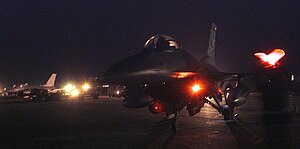This article needs additional citations for verification. (January 2013) |
| 410th Air Expeditionary Wing | |
|---|---|
 F-16 Fighting Falcons from the 410th Air Expeditionary Wing taxi in after a long reconnaissance mission at an airbase in Jordan | |
| Active | 1943–1945, 1962–1995, 2003–present |
| Country | |
| Branch | |
| Type | Air Expeditionary |
| Role | Combat Support |
| Decorations | Distinguished Unit Citation |
| Insignia | |
| 410th Bombardment Wing emblem (approved 17 July 1964)[1] |  |
| World War II Fuselage Codes[2] | 644th Bombardment Squadron 5D 645th Bombardment Squadron 7X 646th Bombardment Squadron 8U 647th Bombardment Squadron 6Q |
The United States Air Force's 410th Air Expeditionary Wing (410 AEW) is a provisional United States Air Force unit assigned to Air Combat Command (ACC) It may be activated or inactivated at any time.
The unit was known to be active during the 2003 invasion of Iraq and in Afghanistan as part of Operation Enduring Freedom.
The wing began as the 410th Bombardment Group, a Douglas A-20 Havoc light bombardment group assigned to Ninth Air Force in Western Europe. The unit helped provide teeth to the IX Bomber Command bombing efforts. It earned the title of the world's best bomb unit for combat accuracy and was the first unit trained in both day and night tactics. The 410th was awarded a Distinguished Unit Citation for its actions during the Battle of the Bulge for the effectiveness of its bombing, 23–25 December 1944, when the group made numerous attacks on German lines of communications. It returned to the United States after the end of the war in Europe, inactivated on 7 November 1945.
The group's heritage was continued in 1963 when the 410th Bombardment Wing was activated as a component of Strategic Air Command's deterrent force during the Cold War, as a strategic bombardment wing. It was inactivated with the closure of K. I. Sawyer AFB, Michigan in the first round of Base Realignment and Closure reductions in September 1995.